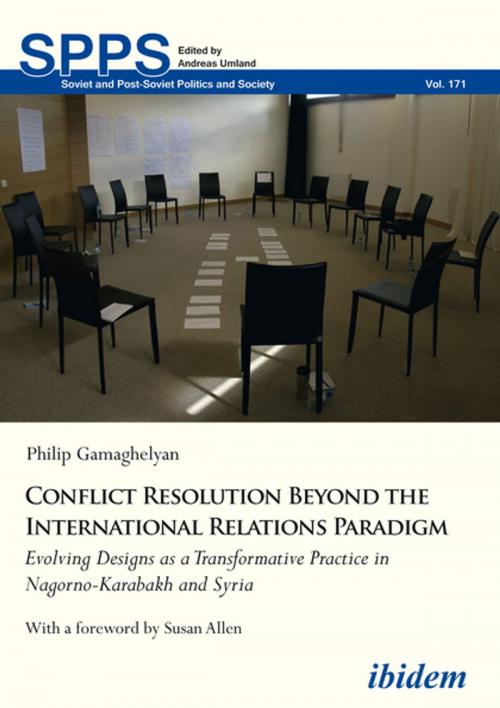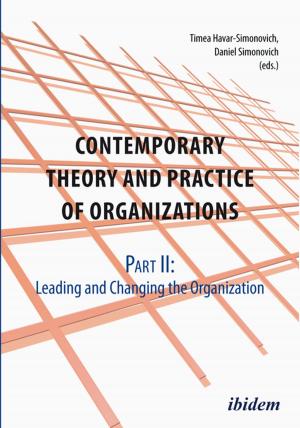Conflict Resolution Beyond the International Relations Paradigm
Evolving Designs as a Transformative Practice in Nagorno-Karabakh and Syria
Nonfiction, Social & Cultural Studies, Political Science, International, International Relations| Author: | Philip Gamaghelyan | ISBN: | 9783838270579 |
| Publisher: | Ibidem Press | Publication: | September 26, 2017 |
| Imprint: | Ibidem Press | Language: | English |
| Author: | Philip Gamaghelyan |
| ISBN: | 9783838270579 |
| Publisher: | Ibidem Press |
| Publication: | September 26, 2017 |
| Imprint: | Ibidem Press |
| Language: | English |
Conflict Resolution holds the promise of freeing approaches and policies with regard to politics of identity from the fatalistic grip of realism. While the conceptual literature on identity and conflicts has moved in this alternative direction, conflict resolution practice continues to rely on realist frames and acts as an unwanted auxiliary to traditional international relations. Perpetuation of conflict discourses, marginalization, and exclusion of affected populations are widespread. They are caused by the overreliance of conflict resolution practice on the binary frames of classic IR paradigms and also by the competitive and hierarchical relationships within the field.
Philip Gamaghelyan relies on participatory action research and collective autoethnography to expose patterns of exclusion and marginalization as well as the paradoxical reproduction of conflict-promoting frames in current conflict-resolution practice applied to the Nagorno-Karabakh and Syrian crises. He builds on the work of postmodernist scholars, on reflective practice, and on discourse analysis to explore alternative and inclusive strategies with a transformative potential.
The IR discipline that has dominated policymaking is only one possible lens, and often a deficient one, for defining, preventing, or resolving contemporary conflicts wrapped in identity politics. Other conceptual frameworks can help to rethink our understanding of identity and conflicts and reconstruct them as performative and not static phenomena. These transformative frameworks are increasingly influential in the conflict resolution field and can be applied to policymaking.
Conflict Resolution holds the promise of freeing approaches and policies with regard to politics of identity from the fatalistic grip of realism. While the conceptual literature on identity and conflicts has moved in this alternative direction, conflict resolution practice continues to rely on realist frames and acts as an unwanted auxiliary to traditional international relations. Perpetuation of conflict discourses, marginalization, and exclusion of affected populations are widespread. They are caused by the overreliance of conflict resolution practice on the binary frames of classic IR paradigms and also by the competitive and hierarchical relationships within the field.
Philip Gamaghelyan relies on participatory action research and collective autoethnography to expose patterns of exclusion and marginalization as well as the paradoxical reproduction of conflict-promoting frames in current conflict-resolution practice applied to the Nagorno-Karabakh and Syrian crises. He builds on the work of postmodernist scholars, on reflective practice, and on discourse analysis to explore alternative and inclusive strategies with a transformative potential.
The IR discipline that has dominated policymaking is only one possible lens, and often a deficient one, for defining, preventing, or resolving contemporary conflicts wrapped in identity politics. Other conceptual frameworks can help to rethink our understanding of identity and conflicts and reconstruct them as performative and not static phenomena. These transformative frameworks are increasingly influential in the conflict resolution field and can be applied to policymaking.











![Cover of the book Erzähltextanalyse [German-language Edition] by Philip Gamaghelyan](https://www.kuoky.com/images/2015/march/300x300/9783838267197-ez2R_300x.jpg)

![Cover of the book Gefährliche Nähe [German-language Edition] by Philip Gamaghelyan](https://www.kuoky.com/images/2015/march/300x300/9783838265698-D56U_300x.jpg)

